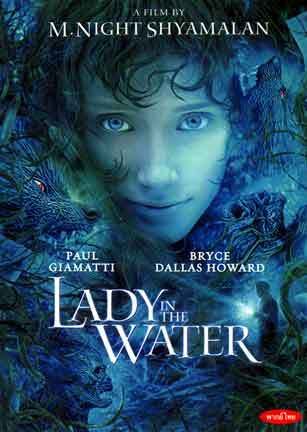This particular entry was, as you might guess, about M. Night Shyamalan. Find the pertinent section here. I was particularly struck by the first sentence Drew McWeeney wrote; "First, he should read Michael Bamberger's The Man Who Heard Voices about 30 times in a row, just so he internalizes how out-of-control precious his reputation was at that point."
Now, as as a film nerd, and one who's grown rather antagonistic with Shyamalan's work, how can you pass up reading a book with that kind of comment attached to it? I was also really amused by the title as amazon listed it, and what appeared on the cover (see image). It was sort of odd that Bamberger was a sports writer, mainly about golf, but, hey, insight can come from anywhere.
I was a little surprised about the book when I actually read it. I think, if you're a big fan/defender of Shyamalan, you'll find the material here to defend that stance, if you're a non-fan, or have grown disenchanted with the man's work, you'll find plenty to damn him with. It's a very even-handed book, despite the fact that Bamberger had to have been allowed into the "inner circle" during Shyamalan's break from Disney after The Village, his move to Warner Brothers, and the making of The Lady in the Water. He could not have written the book if he hadn't. I'd have to say it's a testament to Bamberger's writing/reporting skills that the book feels meticulously even-handed. He's not grinding an ax, but he's also not letting his subject off the hook, either.
 |
| Shyamalan |
I will note that before finishing this book, I put both The Village and The Lady in the Water in my netflix queue, and moved them to the top. I had intended to see both of these films, but just never found the time. The book re-sparked the curiosity. So, I am in no position to judge them creatively, but I think it's common knowledge that Shaymalan's box office has been in a kind of free fall since Signs.
What's really clear in Bamberger's book is that he was witness to a filmmaker slamming headfirst into reality. Shyamalan's absolute belief in his abilities, and that belief's encouragement to a long series of rituals and precious rules, is coming apart from page one. It starts with his leaving Disney, mainly because the executives there, chiefly Nina Jacobson, do not abide by his rules of a Sunday delivery of the script, and then the gall have problems with it.
 |
| Jacobson |
You can see Night spinning as the book goes on, and I think what's revealed here can easily show us what's happened to his career since. He thrives on success, and becomes conflicted and indecisive when he doesn't KNOW he has the answer. His success breeds his confidence, and that confidence breeds his successes. When the pieces of his puzzle began to slip, with The Village, the first time Jacobson questioned him, I think he began to second guess everything.
Certainly there are other mistakes, casting himself in larger and larger roles in his films, for example. By The Lady in the Water, he was playing major supporting roles, and even the most casual moviegoer was questioning why it always had to be about him. It's also really clear that, for Night, The Lady in the Water was about SOMETHING IMPORTANT, it was a message movie, and a major one. There's also no place in the book where he actually seems to be able to articulate what that message is. He says the film is going to "change the world," but but gives not hint what that means. Like I've said many times in this blog...audiences don't give a damn about your message...they care about your story.
I wondered many times, reading the book, if Night would just stop worrying about if people are "with him," or "believe in him," and just worked the script, worked the story, things might's turned out different. Which was kind of what the Disney execs were telling him, in the first place.
I don't know how I feel about Shyamalan after reading the book. I am very impressed that he authorized it with, according to Bamberger, very few changes. It's the same kind of bravery Metallica had in releasing Some Kind of Monster. There's a major dichotomy in him. He wants things to be EXACTLY as he wants them, but he also wants people to do those things because they believe in him, personally. It, again, is the sort of ego-driven motivation you see in this business a lot. "Can't you do it like I tell you because you realize I'm a genius?"
That's easier to do when you can't see that the director's, deep inside, questioning it, too.


The guy is unquestionably a visual genius behind the camera, and he's one of the very few directors out there to get good performances out of child actors (Last Airbender excepted).
ReplyDeleteHis problem is that he's potentially the worst writer that has ever lived. Every single one of his scripts is garbage, including The Sixth Sense. What saves his films is his picturization and some incredible performances. I am an unabashed defender of his first three movies, but starting with The Village, I wrote him off as the hack he has proven to be.
If he would swallow a slice of humble pie and direct a script written by someone else, he might potentially make another great film. Otherwise, he deserves his long, slow fall into obscurity.